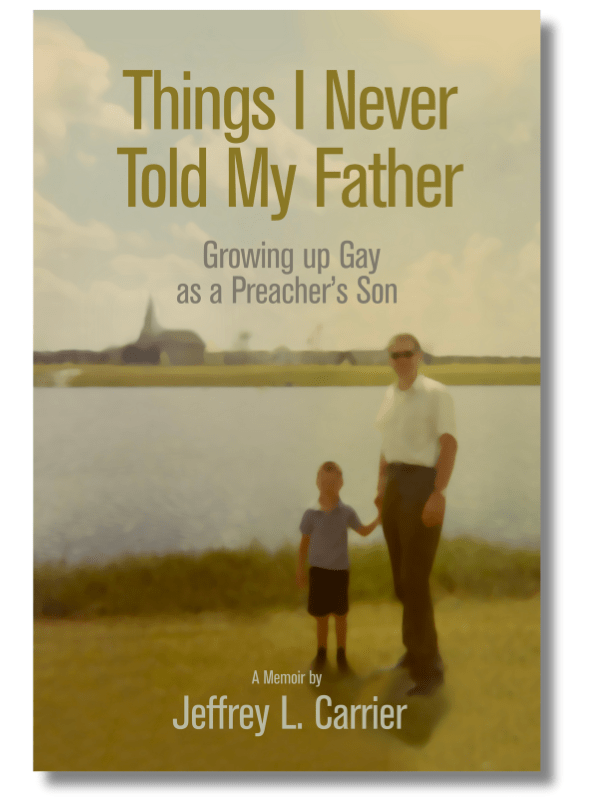Things I Never Told My Father
by Jeffrey L. Carrier
Genre: Memoir / LGBTQ
ISBN: 9798990311701
Print Length: 348 pages
Reviewed by Eric Mayrhofer
Jeffrey L. Carrier’s story fits right in with other homespun legends of our time.
Some of our favorite stories focus on how one ordinary person’s exploits can ripple outward, irrevocably altering history. Take Frodo Baggins. He is one of the smallest voices in Middle Earth, yet his choices shape the survival of all. To stay closer to the reality we know, Forrest Gump is one person who most write off when he’s a child. Despite their dismissal, he grows up to weave through some of America’s most iconic events.
Jeffrey L. Carrier, author of the memoir Things I Never Told My Father, isn’t like Frodo or Forrest in their stature or the specific obstacles they face. He does, however, live a similarly average life that is uplifted by this gently beautiful book. It’s decidedly not about the mark he makes on the world. By showcasing others’ lives—those of his mentors, friends, and family members—with compassion, Carrier’s story instead becomes a look at how the people who weave in and out of our lives change us in remarkable ways. Readers accompany him from his birth in Tennessee through tragedy, family hardship, and his own experience as a gay man moving through a world that isn’t always kind.
With simple prose and a gentle lilt, Carrier’s folksy style captivates from the start. In the opening page alone, he hooks readers with a matter-of-fact description of his near-death experience, and his reluctance to seek help: “I have health insurance, but it comes with a $10,000 deductible. If an ambulance transported me to the hospital, I’d be subjected to a series of tests and probably admitted, perhaps even taken to the ICU…If I survived, I’d be left with a huge medical bill.” His pragmatism is gut-wrenching. You could imagine millions of other people in America having this argument in their heads as they feel a stroke happening. Carrier feels unique in his clarity, though, and it makes this and countless other scenes so much more emotional as a result.
This includes his father’s quick remarrying following his mother’s death—“I was not angry with him because I understood his motivations, but I did feel that I had been pushed to the side…He had gone through such agony during my mother’s illness and death, and he needed some joy in his life.” He offers the same empathy to his stepmother, even when she treats him with cold contempt, saying, “My stepmother was never very kind to me, but I think I can understand why. Her children’s troubled lives cause her a lot of anguish. My father never had to worry about me.” In these sparkling moments throughout the book, Carrier’s abundance of compassion and forgiveness makes your heart want to burst.
Carrier’s propensity for understanding and compassion can occasionally weigh down the book though too. While deep dives into his friends’ and important family members’ lives are welcome, giving his supporters emotional heft that makes later chapters more powerful for having the extra context, they can feel slightly overwhelming. This is truer in earlier pages, as we spend chapters on Bulah, a maternal figure; his sharp-eyed Aunt Ginny; and his grandmothers. It also pops up in passages describing his first forays into New York City, interrupting the wonder and discovery of an emerging gay man first experiencing Manhattan. At first, these episodes and asides make the book read more like an autobiography—a bit broader than a typical memoir, a little less laser-focused—making readers question how these exquisite snippets build into the satisfying whole.
They do, though. Carrier’s affinity for the elderly makes him more accepting of the failures of age and the unfairness of loss. The unfortunate distance he experiences with his father and his stepmother’s cruelty teaches him to coexist with adversity and be open to all. Even when it seems like the anecdotes of a first-grade teacher become too much, a touching insight comes along to remind readers that each person “had a hand in making me the person I grew up to be.”
By the last page, Carrier’s approach forms a sweeping personal epic with a sum greater than—and elevated by—all of its glistening, heartwarming parts.
Thank you for reading Eric Mayrhofer’s book review of Things I Never Told My Father by Jeffrey L. Carrier! If you liked what you read, please spend some more time with us at the links below.
The post Book Review: Things I Never Told My Father appeared first on Independent Book Review.
